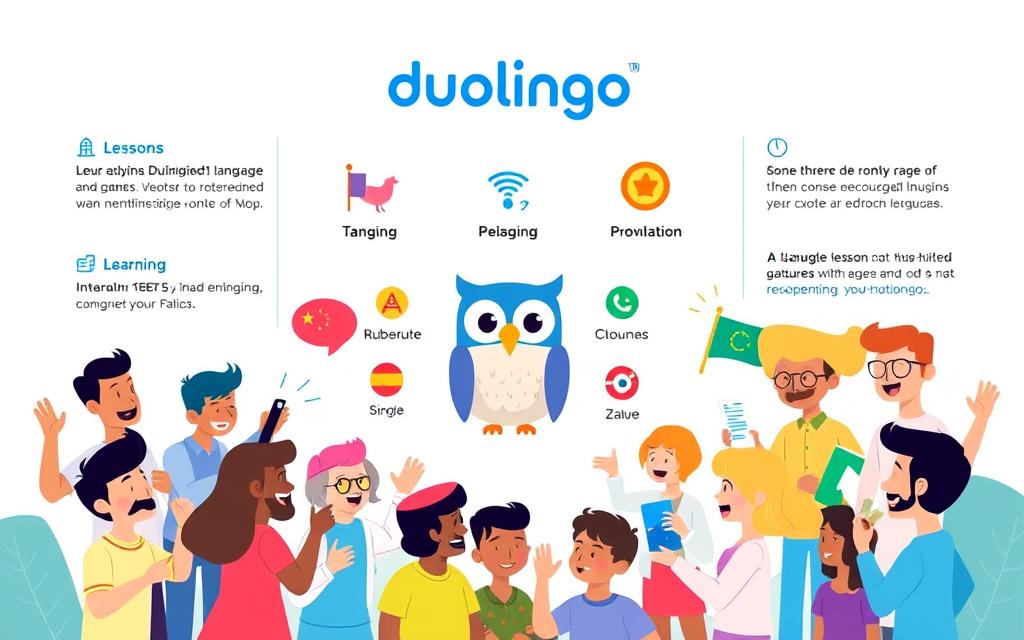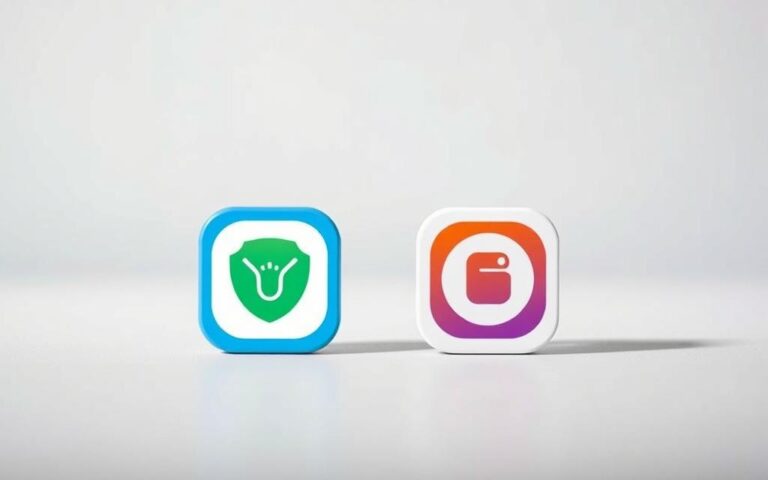Did you know Duolingo has over 500 million users worldwide as of 2023? It’s one of the top language learning apps. But, is it good for learning a new language? In this Duolingo review, we’ll explore its features, teaching methods, and what users say. This will help you decide if Duolingo is right for you.
Overview of Duolingo and Its Features
Launched in 2011, Duolingo changed how we learn languages. It’s known for its fun approach and many language options. This section looks at what makes Duolingo great, including its benefits and how it makes learning fun.
Brief History and Development of Duolingo
Duolingo started as a dream to teach languages for free worldwide. Today, it offers lessons in over 30 languages. It keeps getting better, showing it listens to what users want.
Key Features That Set Duolingo Apart
Duolingo uses games to teach languages. You get rewards for your progress, making learning fun. It has lots of activities, like listening and speaking, to keep things interesting.
User-Friendly Interface and Accessibility
Duolingo is easy for everyone to use, no matter their age or background. Its design makes learning simple and enjoyable. You can learn at your own pace, and there’s an app for learning on the go.

Assessing the Quality of Language Learning on Duolingo
Duolingo is a top choice for learning languages. It uses fun strategies to keep users interested and learning. It’s known for its teaching methods, vocabulary, and grammar lessons, and for helping learners at all levels.
Teaching Methodology: Gamification and Progress Tracking
Duolingo makes learning fun with games and challenges. Users get points and achievements, and can even compete with others. This keeps them coming back for more. They can also see how they’re doing, which helps them stay on track.
Vocabulary and Grammar Coverage
Duolingo has lessons for all skill levels. You can learn from simple greetings to complex conversations. It covers a lot of ground, helping learners build a strong foundation in their chosen language.
Language Proficiency Levels Offered
Duolingo meets learners where they are, from beginners to advanced. It guides them step by step, helping them reach their language goals. This flexibility makes it a great choice for anyone looking to improve their language skills.
| Aspect | Details |
|---|---|
| Gamification | Earning points, achievements, and friendly competition |
| Progress Tracking | Monitoring individual growth and lesson completion |
| Vocabulary Coverage | Wide range of topics from basic to advanced |
| Grammar Coverage | Lessons on fundamental grammar rules and usage |
| Proficiency Levels | Beginner, Intermediate, and Advanced courses available |
User Feedback: What Are Learners Saying About Duolingo?
People have mixed feelings about Duolingo. Some love it, while others have complaints. Real user feedback gives us a detailed look at Duolingo’s strengths and weaknesses. It shows how Duolingo affects language learning.
Positive Testimonials and Success Stories
Many users are thrilled with Duolingo. They love how it makes learning fun through games. They also appreciate seeing their progress grow.
- “I’ve been able to hold conversations in Spanish after just a few months of using Duolingo!”
- “The daily reminders keep me consistent, which is crucial for language learning.”
- “Duolingo made learning fun and engaging. I’m excited to learn more!”
Common Criticisms and Limitations
Despite the praise, Duolingo has its downsides. Some users say it doesn’t teach enough about speaking. Others find the grammar explanations unclear.
- Limited focus on conversational skills, leading to challenges in real-life speaking situations.
- Some learners feel that grammar explanations lack clarity.
- Over-reliance on repetition without context can become monotonous.
Comparative Analysis with Other Language Learning Apps
Users often compare Duolingo with other apps. Here’s a quick look at how Duolingo compares:
| Feature | Duolingo | Babbel | Rosetta Stone |
|---|---|---|---|
| Gamification | ✔️ | ❌ | ❌ |
| Grammar Explanation | Limited | Detailed | Comprehensive |
| Offline Access | ✔️ | ✔️ | ✔️ |
| Speaking Practice | Limited | Good | Excellent |
Duolingo’s Impact on Language Learning Habits
Digital platforms like Duolingo have changed how we learn languages. Old methods are now mixed with new tech. This change is making learning languages more fun and effective.
Changes in Learning Approaches Due to Technology
Technology has changed how we learn new languages. Duolingo lets you learn at your own pace. This makes learning fit your life better.
It also adds fun with games. This keeps you motivated to keep learning.
Community Engagement and Social Learning
Duolingo has features for connecting with others. You can share tips and learn from others. This makes learning a team effort.
It helps you stay on track and learn more. You get to practice speaking and listening with others.
Long-Term Retention of Language Skills
How well you keep learning languages is key. Duolingo uses spaced repetition to help you remember. This makes learning stick with you longer.
It’s not easy to keep up, but Duolingo makes it fun. This keeps you practicing and improving your skills.
Alternative Free Online Course Apps That Offer Certification
Many tools help learners improve their language skills. Apps like Babbel and Rosetta Stone stand out. They offer unique features and learning methods. This section looks at these alternatives and their certification options, which can greatly help learners.
Overview of Competitors: Babbel, Rosetta Stone, and Others
Babbel focuses on real-life talks and useful words. It starts with content that matters. Rosetta Stone uses pictures and sounds to teach. Other apps like Busuu and Memrise also have different ways to learn.
Each app offers different levels of fun and depth in learning.
Certification Opportunities and Their Value
Certifications can make a learner’s skills stand out. Babbel and Rosetta Stone give out certificates when you finish a course. This is great for job seekers.
But, Duolingo’s certificates are not as well-known. This might make them less useful for jobs.
Pros and Cons of Alternative Learning Platforms
Knowing the good and bad of each app helps learners choose wisely:
- Babbel:
- Pros: Real-life talks, clear lessons
- Cons: Costs money, doesn’t focus on grammar
- Rosetta Stone:
- Pros: Immersive, lots of words
- Cons: Expensive, needs more time
- Busuu:
- Pros: Gets feedback, good for talking
- Cons: Limited free stuff, not as structured
- Memrise:
- Pros: Fun, helps remember words
- Cons: Lessons vary, not much grammar
Looking at different apps helps learners find what suits them best. With many certification options, learners can prove their skills and try out different learning styles.
| Platform | Certification | Key Features |
|---|---|---|
| Babbel | Yes | Real-life dialogue and practical vocabulary |
| Rosetta Stone | Yes | Immersive learning with visual and auditory cues |
| Busuu | No | Community feedback and speaking practice |
| Memrise | No | Engaging mnemonics for memory retention |
Conclusion: Is Duolingo the Right Choice for You?
Looking at Duolingo, it’s clear it’s a great tool for many. It makes learning fun with games and tracks your progress. But, how well it works depends on your learning style and goals.
Some people find it perfect for them. Others might want more depth that Duolingo doesn’t offer.
Final Thoughts on Duolingo’s Effectiveness
Even though Duolingo gets good reviews, it’s not for everyone. Beginners love it, but advanced learners might need more. It’s important to see if Duolingo fits your goals.
Factors to Consider When Choosing a Language App
Think about your learning style, the language you want to learn, and your goals. Duolingo is great for quick conversations. But, if you want deep grammar and culture, look elsewhere.
Recommendations for Maximizing Your Learning Experience
To get the most out of Duolingo, add things like talking to native speakers and reading extra materials. Joining language groups online can also help. This mix can make your learning better and more fun.
Whether Duolingo is good for you depends on what you like and how much you practice.



